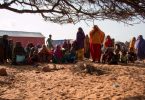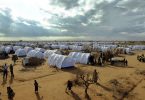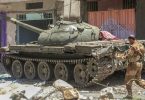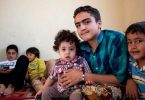By Abdullah Alsalimi
After a year of armistice in the North of Yemen, the sixth round of the armed confrontations between the state and the Houthi rebels appears to be stable.
This, at least, is the de jure status of the hostilities. In fact, war has still generally continued in many parts of Sa’ada and its neighboring governorates, although its aspect has notably changed.
A few kilometers to the south of Sa’ada city, military vehicles and artillery have been stationed in an attempt to separate the parties to conflict last month.
One of these sides is, of course, the Houthis themselves, who have remained relatively far from the city. Their adversaries are while the Al Abdeen tribes, headed by the Sheikh and member of parliament Othman Mujali, who are deployed quite close to the capital city.
Over the past two months, many tribal nobles and military commanders have failed to successfully mediate a solution to the crisis between the two parties.
In another ongoing standoff, fighting intensified between armed Houthi fighters and Sheikh Mujali’s tribesmen in the Bir Yaqub area south of Sa’ada.
Four mortar shells were loosed upon a public market in Sheikh Mujali last month. Another four missiles landed near the financial office and the Central Bank of Yemen’s Sa’ada branch.
Local sources in Sa’ada said the missiles were launched from the Mahdha area, west of governorate center and just outside the base of the central security. The same sources reported that Houthi rebels launched missiles at military targets associated with their tribal adversaries in the area, but missed and hit populated civilian areas.
Equation of Force Rewritten
The state, though supported by the armed local tribes, was the main actor challenging the sway of the Houthis during the last six wars in the North.
Since the peace agreement in February of last year, however, the equation has been changed by the announcement of an official cessation of hostilities.
Now, Qatar supposedly mediates between the Houthi group and the state. A Qatari delegation visits Yemen’s North from time to time to supervise the implementation of the peace.
Despite the apparent desire by the two parities to build mutual confidence and execute the terms of their convention, in the last months, the tribal elements have appeared to be in essentially open war with the Houthis.
The Local Council General Secretary in Sa’ada, Mohammed Idha Al-Imad, minimized the danger the clashes between the Houthis and the tribes could have on the peace process.
He dismissed reports that the fighting had left many killed, wounded and homeless by as mere “obstacles” facing the full implementation of the peace in the governorate.
Al-Imad was eager to describe what was happening as products of mistakes and wrong-doing perpetrated by the Houthis. He added, “Six years of war revealed without any doubt those behind the current difficulties, and what must be done to solve most of them for the long-term.”
He noted that residual clashes involving the tribes was only natural, considering the assistance the latter furnished the state in the recent wars, and the misgivings the Houthis must still harbor for their local foes, despite the peace agreement.
While the Local Council General Secretary expressed that the Local Authority is ambitious to solve the remaining problems between the tribes and Houthis, he was afraid of the possibility of a long-term escalation between the two parties.
In light of the prevalence of custom, and general economic and political isolation of Sa’ada governorate, tribal vendettas spanning decades, even before the state’s war with the Houthis, has complicated the reconciliation process.
Tribal revenge heavily overlays the tribal-Houthi hostilities, as the customary laws of an essentially ungoverned areas dictates the seeking of satisfaction for lost kinsmen, and appears to override the diplomatic understandings agreed upon through Qatar’s agency.
Despite the fact that tribes opposed to the Houthis share many ties of geography and kinship with their enemies, the six rounds of war has decimated the traditional understandings and agreements in the area, and has apparently left the area hopelessly at war with itself.
In the middle of last year, “the tribal alliance of Sa’ada citizens” was declared under leadership of Sheikh Yahia Mugeet, who belongs to a prominent tribal family to which different tribes of Khawlan, Bani Amer, and Sa’ada traditionally looked toward for leadership.
Tribal Disappointment
Speaking of the organization, Yahia Mugeet said its establishment came as a reaction to what he called “the state’s disavowal of the tribal people who supported the state in its war against Houthi.”
Mugeet accused the Houthi group of blatant aggression and attempting to assassinate him two months ago in Bab al-Salam in Sana’a – an attack which he survived, while Sheikh Sadam Hussien Rawkan, one leaders from Hidan accompanying him, was been killed.
The official spokesman of the Houthis, Mohammed Abdulsalam has denied the complicity of his group in the violence against Sheikh Mugeet and his entourage. He said that the clashes took place among tribes and Houthis strictly in Sa’ada, and that the events in Sanaa had no connection to it.
Sheikh Yahia Mugeet said that the state delivered the tribal people to the Houthis’ wrath. He stated that the security forces and army soldiers have passed through Houthi checkpoints without being obstructed in any way.
But some tribesmen, especially those who are known to have participated with the state in the recent wars, are arrested by Houthi gunmen while passing through these checkpoints.
The state likely desired to affect the ceasefire agreement in Sa’ada over all other considerations, and its relationship with its Northern tribal allies was likely a distant priority.
The state’s policy has certainly called for extreme care in handling the Houthi-tribal conflict, as it wishes to stand an equal distance between the two parties.
This has caused the tribespeople formerly affiliated with the state great anguish, as they believe patronage from the government is the just reward of their loyalty.
There are many examples that the state, through prominent military commanders, has undertaken efforts to reconcile between disgruntled tribes and the Houthis.
Deputy minister of interior, Mohammed Fadhel Al-Qawsi, led a mediation effort two months ago resulting in a fleeting peace between the Houthis and the Al Abdeen tribe, which is led by Sheikh Othman Mujali.
The armistice was to last for at least four months, but it broke down after only one.
But the Peace Congress General Secretary said of the aggrieved tribes’, “the must understand the state’s necessary nonalignment of the State in this situation.
“The State is the umbrella of all and it is the responsible to them without discrimination. The state is in a state of peace with the Houthis, and it is eager not to take part in any breach which will lead to the collapse of the peace efforts.”
“Hence, the State is not disappointing the tribes with whom they were allied in their war with the Houthis.”
Al-Qawsi continued, “as long as the state is in a peace agreement, it is necessary for those who sided with the state in these hostilities to do the same.”
However, whether the state is officially at peace with the North or not, it does not change the reality that the war has not yet come to an end in Sa’ada.






